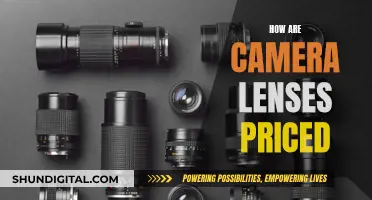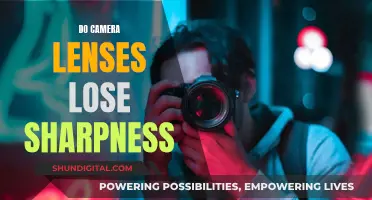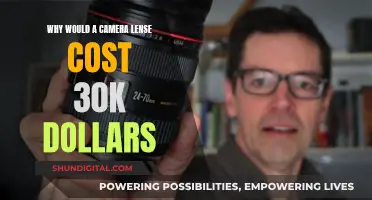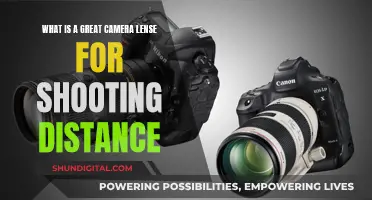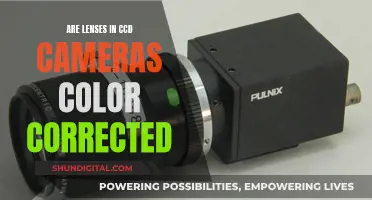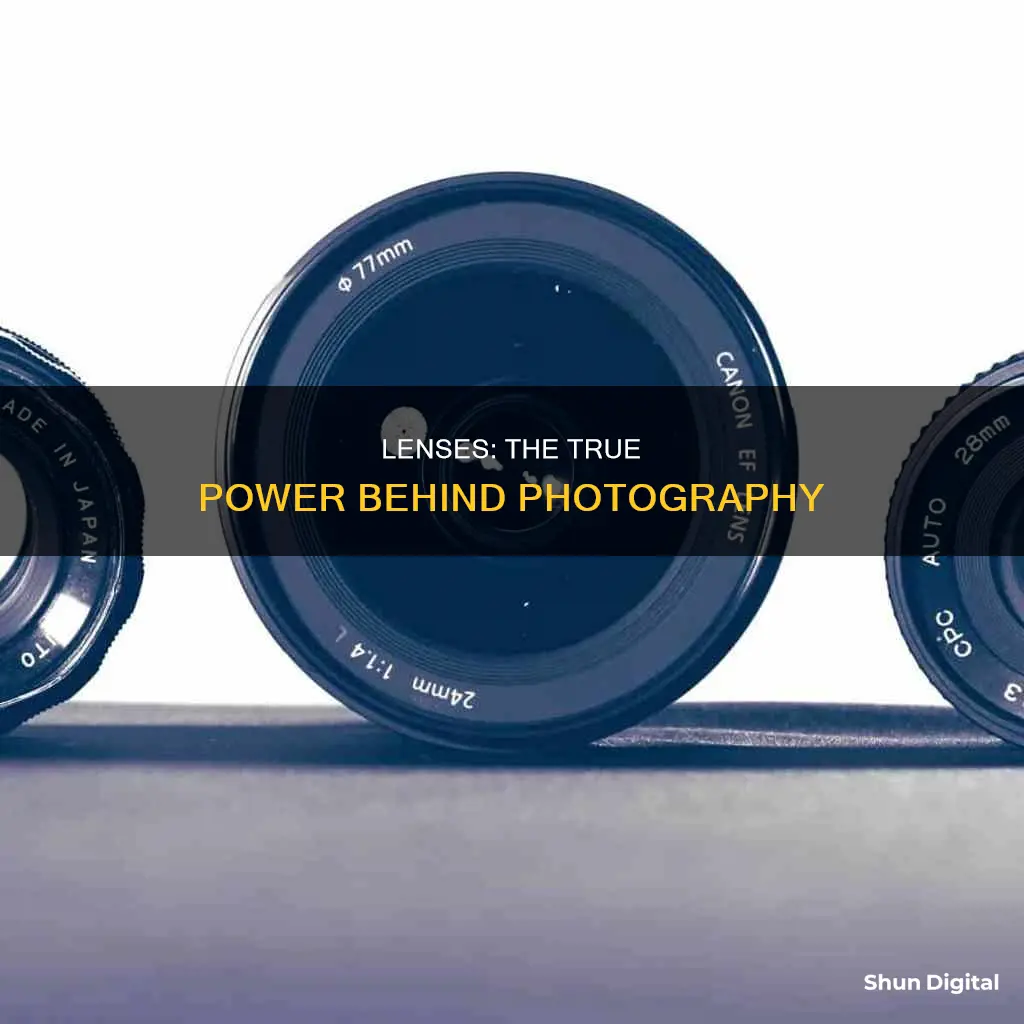
The age-old debate of whether lenses or cameras are more important to photographers has been ongoing for years, with many arguing that lenses are more important than the camera body. The focal length and f-stop are two main attributes of every camera lens, with the former determining how close or wide a shot can be, and the latter dictating how wide the aperture can open. While the camera body is important for autofocus speed and tracking, continuous shooting speeds, comfort when shooting, and speed when changing settings, lenses are often seen as a more important investment. This is because lenses have more to do with picture quality and ease of use, and they retain their monetary and photographic value for longer. Lenses are also more durable than camera bodies and lens technology changes more slowly, meaning lenses can last for decades.
| Characteristics | Values |
|---|---|
| Image Quality | A lens has a greater impact on image quality than a camera body. |
| Durability | Lenses are more durable than camera bodies. |
| Resale Value | Lenses retain more of their resale value than camera bodies. |
| Autofocus Speed | Autofocus speed depends on the lens's focusing system. |
| Shooting Comfort | The camera body and lens both affect comfort when shooting. |
| Shooting Speed | The camera body and lens both affect speed when changing settings. |
| Artistic Look | The lens offers more control over the artistic look of photos than the camera body. |
| Upgrade Frequency | Camera bodies are upgraded more frequently than lenses. |
| Upgrade Investment | A lens is often a better investment than a camera body due to its durability and resale value. |
What You'll Learn

Lenses vs camera bodies: which should you upgrade?
Overview
The age-old question of whether to invest in a new camera or new lenses has plagued photographers for decades. While both have their merits, there are several key considerations to keep in mind when deciding where to allocate your funds. In this article, we will delve into the advantages of upgrading each component and provide guidance on how to make an informed decision based on your specific needs and preferences.
Understanding Your Gear
Before delving into the debate, it's crucial to assess your current gear and identify its weaknesses. Ask yourself: What are my gear weaknesses? What are my technical weaknesses? And what matters to me most as a photographer? For instance, if you aspire to capture bird photography but lack the necessary focal length, your gear weakness may be insufficient. On the other hand, if you desire to create stunning wide-angle nightscapes, your gear limitations might include a lack of high-ISO capabilities and a slow lens.
The Significance of Camera Bodies
Upgrading your camera body can have a significant impact on several aspects of your photography. Firstly, it affects autofocus speed and tracking, continuous shooting or burst mode speeds, comfort when shooting, and the speed of changing settings. Higher-end cameras often offer improved weather sealing, making them more durable and long-lasting, especially for outdoor photographers who frequently encounter harsh conditions. Additionally, a new camera body can enhance your image quality, particularly in challenging situations like low-light photography, where higher-end cameras excel with lower noise levels.
The Importance of Lenses
Lenses play a pivotal role in determining image quality and artistic expression. They influence the sharpness, aperture, focal length, and overall look of your photographs. A high-quality lens can elevate your images, even when paired with a lower-end camera body. Lenses are also known for their durability and longevity, often outliving multiple camera bodies. They retain their resale value better than camera bodies, making them a wise investment. Additionally, lenses offer more opportunities for creative control, allowing you to achieve background bokeh, sharp subjects, and perfect compositions.
Making the Decision
When deciding between upgrading your camera or lenses, it's essential to recognize your key weaknesses and determine which option will have the most significant impact on your photography. While lenses heavily influence image quality, cameras play a crucial role in autofocusing and ergonomics. Consider your specific needs and the type of photography you specialize in or aspire to pursue. If you're an outdoor photographer, the durability and weather sealing of a higher-end camera body may be a priority. On the other hand, if you prioritize image quality and creative control, investing in a high-quality lens might be the better choice.
In conclusion, the decision to upgrade your camera or lenses depends on your unique circumstances and goals as a photographer. Both have their advantages, and by assessing your weaknesses and priorities, you can make an informed choice that aligns with your vision. Remember, the most important thing is to create stunning images that inspire and captivate your audience.
Cleaning Camera Lenses: A Step-by-Step Guide
You may want to see also

The importance of lenses for beginners
Lenses are arguably more important than the camera body, and this is especially true for beginners.
As a beginner, it is important to focus on the basics and not get too caught up in the technical specifications of your equipment. A good lens will allow you to capture clear and crisp photos, which is essential for any photographer, regardless of their skill level.
When choosing a lens, there are two main attributes to consider: focal length and f-stop. The focal length determines how close or how wide you can get with the lens. For example, an 18mm lens can produce a very wide-angle shot, while a 200mm lens can get you very close to the subject. The f-stop determines how wide the aperture can open, with a lower f-stop value indicating a wider aperture. This is important because it affects how much light the lens can let in, with wider apertures allowing for more light to enter the camera.
It is also worth noting that lenses tend to last longer than camera bodies. Lenses are more durable and lens technology changes more slowly, so a lens can often be used for decades, while camera bodies may need to be upgraded more frequently. This means that investing in a good lens is a wise decision, as it will not only provide better image quality but also last longer.
Additionally, lenses offer more creative control over the artistic look of your photos. Aperture, focal length, and sharpness are all dictated by the lens, so by using different lenses and adjusting their settings, you can achieve various effects, such as beautiful background blur (bokeh), sharp subjects, and perfect compositions.
While the camera body is important and can affect aspects such as autofocus speed, tracking, and comfort when shooting, it is generally recommended that beginners prioritize investing in good lenses over an expensive camera body. This will provide a strong foundation for developing their photography skills and allow them to create high-quality images.
In summary, for beginners, investing in quality lenses is of utmost importance. Lenses play a crucial role in determining image quality, offer creative control, and tend to be a longer-lasting investment. By choosing lenses with the right focal length and f-stop for your needs, you will be well-equipped to capture stunning photographs and develop your skills as a photographer.
Lenses Unlocked: Capturing Unique Perspectives and Effects
You may want to see also

Lenses are a better investment than camera bodies
Lenses play a crucial role in determining the type of shots you can take. The focal length of a lens, for instance, dictates how close or how wide you can go with your shot. A lens with a wide maximum aperture will enable you to capture stunning background bokeh and creamy background portraits. Additionally, lens sharpness, though important, is just one of several key characteristics that contribute to image quality.
Lenses are more durable than camera bodies, and lens technology changes at a slower pace. While a camera from five years ago may be outperformed by newer releases, many lenses remain top-notch even after five, ten, or twenty years. For instance, a Nikon 17-35mm f/2.8 lens bought in 2000 is still the best wide zoom option for the Nikon D3 camera.
Furthermore, lenses will retain a larger portion of their resale value compared to camera bodies. Camera models quickly become outdated and lose value when newer versions are released. In contrast, lenses often hold their value, with some even increasing in price over time.
Therefore, if you're debating between upgrading your camera or investing in better lenses, consider your specific needs and weaknesses as a photographer. Ask yourself: What are my gear weaknesses? What are my technical weaknesses? What matters to me most as a photographer?
While camera bodies are crucial and can significantly impact autofocusing and ergonomics, lenses are often the better investment for the long term, offering both exceptional image quality and durability.
Camera Lenses in China: Cheaper or Expensive?
You may want to see also

Lenses determine the type of shots you can take
Lenses play a crucial role in determining the types of shots you can capture, as they offer a variety of focal lengths and aperture sizes. The focal length of a lens dictates how close or wide your shot can be. For instance, an 18mm lens facilitates a very wide-angle shot, while a 200mm lens allows you to get up close and personal with your subject.
The aperture size, or f-stop, of a lens determines how much light it can let in. A lens with a larger aperture, such as f/1.4, will produce brighter and better-lit images than a lens with a smaller aperture, like f/4.0. This is especially important when considering indoor or nighttime photography, where lighting conditions may be less than ideal.
Additionally, lenses with larger apertures can create a shallow depth of field, resulting in beautiful background bokeh. This artistic effect is highly sought after in portrait and close-up photography.
It's worth noting that zoom lenses, which offer variable focal lengths, often come with trade-offs. They tend to be heavier and bulkier, and unless you invest a significant amount, they may have inferior glass, impacting the overall image quality.
When deciding between upgrading your camera or investing in lenses, it's essential to consider your specific needs and weaknesses as a photographer. Lenses are often seen as a better investment due to their durability, slower technological changes, and higher resale value. They can significantly impact image quality and are versatile enough to be used with different camera bodies.
In summary, lenses are a pivotal component of your photography setup, influencing the types of shots you can take and the overall artistic look of your images.
Camera Lenses: Reselling and Buying Used
You may want to see also

Camera bodies vs lenses: image quality
The age-old question of whether the camera or the lens is more important to image quality has been debated by photographers for years. While both play a significant role in the final image, there are strong arguments for why lenses may be the more crucial factor.
Firstly, lenses offer far more control over the artistic look of photographs. Aperture, focal length, and sharpness are all dictated by the lens, and these factors heavily influence the background bokeh, subject sharpness, composition, and more. A lens with a wide maximum aperture, for instance, is essential for low-light photography and achieving a shallow depth of field.
Photographers often experiment with pairing high-end lenses with low-end camera bodies and vice versa, and they find that audiences tend to prefer the images produced by the high-end lens and low-end body combination. This demonstrates the significant impact of the lens on image quality.
Additionally, lenses are generally a better investment than camera bodies when considering durability and longevity. Lenses are more durable, and lens technology changes at a slower pace. Photographers often use the same lenses for decades, while camera bodies are upgraded more frequently. Lenses also retain more of their resale value compared to cameras, which quickly become outdated and lose value when newer models are released.
However, it is important to note that both the camera and the lens play a role in image quality. The camera affects aspects such as autofocus speed and tracking, continuous shooting speeds, comfort when shooting, and speed when changing settings.
In conclusion, while both camera bodies and lenses are important, lenses may have a more significant impact on image quality and are often a wiser investment in the long run. Ultimately, the decision to upgrade either the camera or the lens depends on the photographer's specific needs and weaknesses.
DX Lenses: Compatible with FX Cameras?
You may want to see also
Frequently asked questions
Yes, a photographer's lenses are more important than their camera. A crappy camera can take amazing images with great lenses, while a great camera can take poor images with a terrible lens.
Lenses have more to do with picture quality and ease of use. Lenses also retain their monetary and photographic value, whereas camera bodies become worth very little in a few years.
The focal length and f-stop. The focal length determines how close or wide you can get with the lens, while the f-stop determines how wide the aperture can open.
Autofocus speed and tracking, continuous shooting (burst mode) speeds, comfort when shooting, and speed when changing settings.


